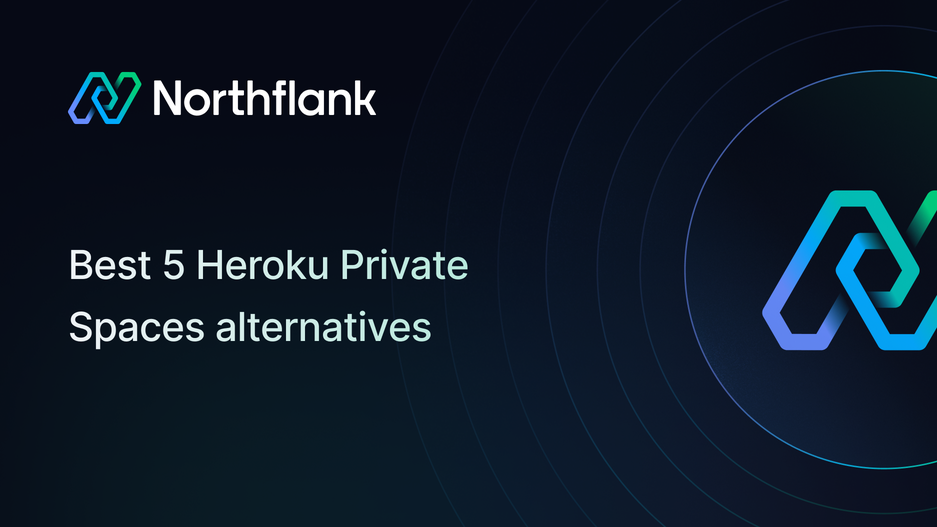

Best 5 Heroku Private Spaces alternatives in 2026
Heroku Private Spaces are dedicated, network-isolated environments for running applications and data services that meet strict security and compliance requirements. These spaces provide organizations with enhanced network controls, stable outbound IP addresses, and the ability to connect securely with on-premise systems and other cloud services.
However, as development teams evaluate their infrastructure options, many are considering alternatives that offer similar security features with more flexibility, better pricing models, or additional capabilities.
If you're looking for more control over your infrastructure, want cost savings, or need features that Heroku Private Spaces doesn't provide, this guide covers the top alternatives available in 2026.
Heroku Private Spaces are dedicated runtime environments that provide network-isolated infrastructure for running applications and data services. Each Private Space operates as a private network with its own dedicated dyno runtime, separate from Heroku's multi-tenant Common Runtime.
Private Spaces offer network controls including trusted IP ranges for restricting inbound access, stable outbound IP addresses for allowlisting with external services, and VPN connectivity for secure integration with on-premise infrastructure. Organizations can deploy Private Spaces in multiple global regions and configure custom network rules to meet security and compliance requirements.
When evaluating alternatives to Heroku Private Spaces, keep these factors in mind:
- Network isolation and security features: The alternative should provide dedicated, isolated network environments with robust security controls. Look for features like private subnets, security groups, and network ACLs that let you control traffic at multiple layers.
- VPN and private networking capabilities: Your alternative should support secure connections to on-premise infrastructure through VPN or direct connect options, as well as private communication between services without traversing the public internet.
- Compliance certifications: For regulated industries, ensure the platform maintains relevant certifications like SOC 2, HIPAA, PCI-DSS, or GDPR compliance to meet your organization's requirements.
- Pricing transparency: Unlike Heroku's monthly caps, look for alternatives with clear, predictable pricing models. Pay-as-you-go options can be more cost-effective for varying workloads.
- Performance and reliability: Evaluate the platform's track record for uptime, the quality of its infrastructure, and whether it offers features like automatic failover and multi-region deployment.
- Migration difficulty: Consider how easily you can move your existing applications and data. Look for platforms that support your current tech stack and provide migration guides or tools.
We'll review the best alternatives to Heroku Private Spaces based on their private networking capabilities, security features, compliance support, pricing models, and ease of migration.
Northflank is a comprehensive cloud platform that combines private networking, security features, and developer-friendly orchestration without the complexity of managing Kubernetes directly.
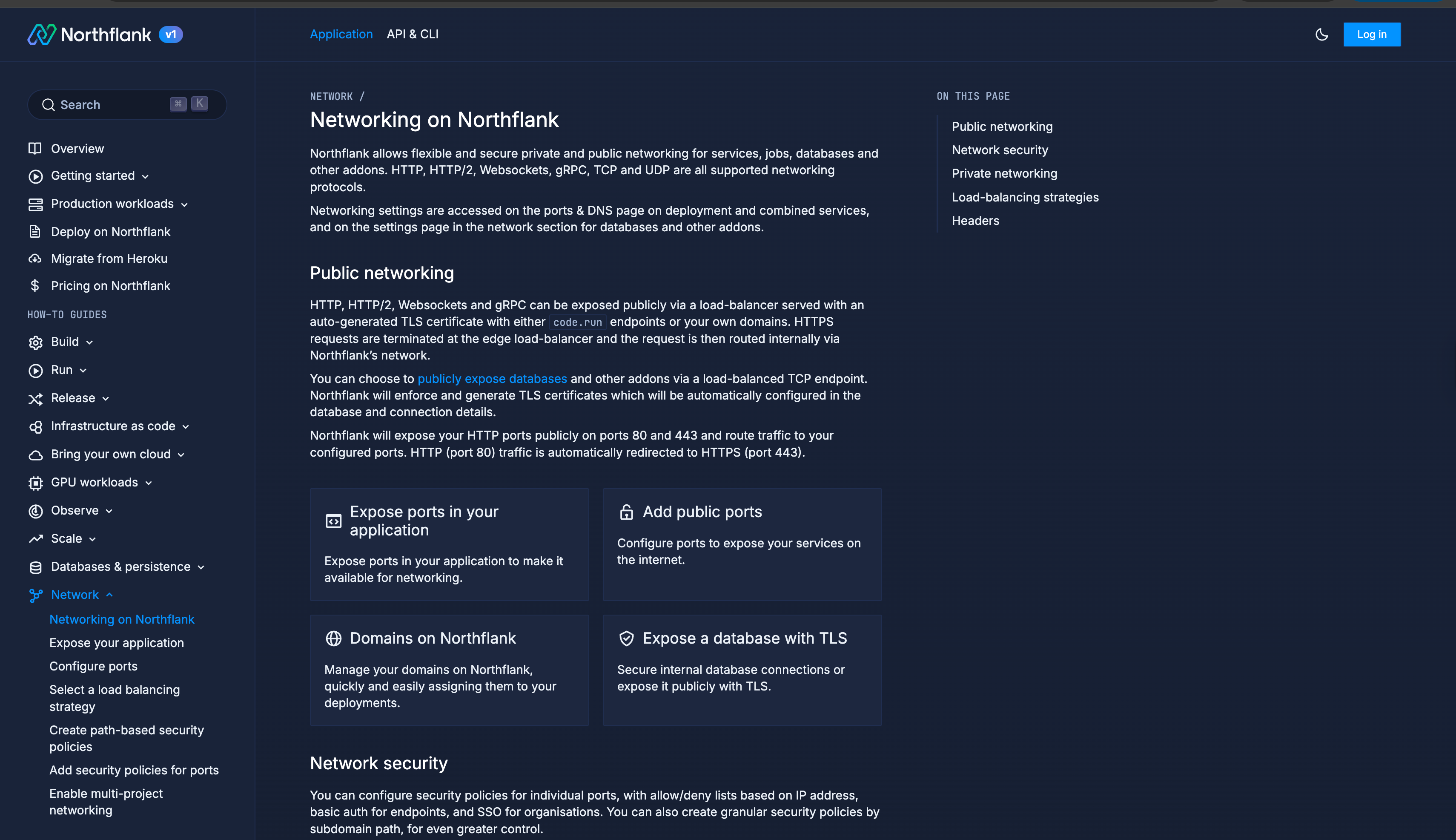
Private networking features:
- Flexible private and public networking for services, databases, and other addons (See how)
- Support for HTTP, HTTP/2, Websockets, gRPC, TCP, and UDP protocols (See how)
- Services and databases can be deployed with private networking to limit connectivity by project namespace
- Connect to private endpoints locally using the Northflank CLI proxy
- Configure security policies for individual ports with IP-based allow/deny lists, basic authentication, and SSO
- Create granular security policies by subdomain path for greater control
Security and compliance:
- Enterprise-grade security with role-based access control (RBAC) and audit logs
- Deploy in your own cloud accounts across AWS, GCP, Azure, Oracle Cloud, Civo or bare-metal for complete data control (See how)
- Advanced private cluster and node networking options
- Cross-project private networking (See how)
- VPN Tailscale support (See how)
- Path-based routing capabilities (See how)
Pricing:
- Free sandbox tier for getting started
- Pay-as-you-go plans for production workloads with per-second billing
- Enterprise plans for organizations with advanced requirements
- Pricing calculator and transparent pricing page for detailed cost estimates
- Significantly more cost-effective than Heroku Private Spaces' monthly minimum fees for smaller teams or variable workloads
Migration path:
Northflank provides comprehensive documentation for migrating from Heroku, including guides for moving applications, databases, and environment variables. The platform supports both Docker containers and buildpacks, making it straightforward to transition existing Heroku applications.
Related resources:
Amazon Virtual Private Cloud gives you complete control over your virtual networking environment, including resource placement, connectivity, and security. AWS VPC is the self-managed route for organizations that want maximum flexibility and are comfortable handling infrastructure operations.
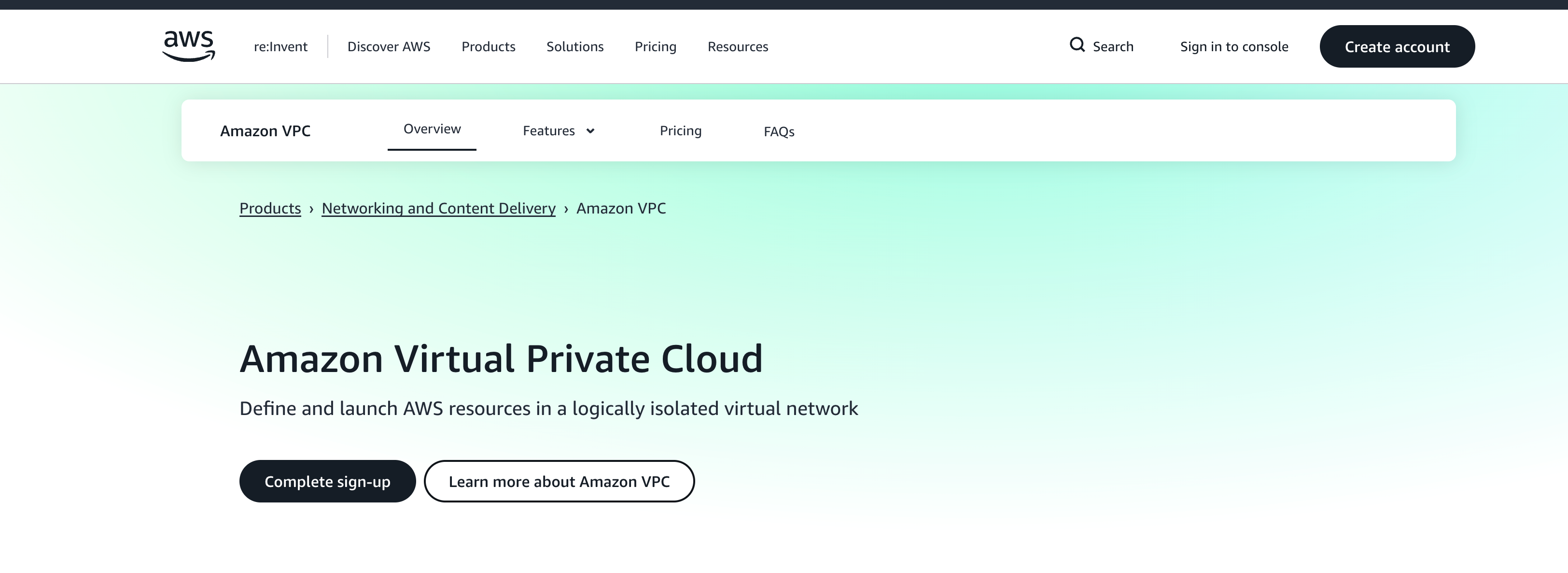
Features overview:
- Isolated virtual networks with customizable IP address ranges and multiple subnets across availability zones
- Route tables, internet gateways, and NAT gateways for traffic management
- Security groups and Network ACLs for multi-layer traffic control
- VPN connections and AWS Direct Connect for hybrid cloud architectures
- AWS PrivateLink for private connectivity between VPCs and AWS services without exposing traffic to the public internet
- VPC peering to route traffic between multiple VPCs
- Transit Gateway as a central hub for interconnecting VPCs and on-premise networks
- VPC endpoints for accessing AWS services privately
When it makes sense:
AWS VPC is ideal for organizations with dedicated DevOps teams who need granular control over network architecture. It's particularly suitable for enterprise workloads with complex compliance requirements, hybrid cloud deployments connecting AWS with on-premise infrastructure, or teams already deeply invested in the AWS ecosystem who can leverage native integrations.
Note: For teams that need similar private networking capabilities without the operational complexity of managing VPCs, route tables, and security groups directly, Northflank offers a managed alternative that handles the infrastructure layer while providing enterprise-grade networking features.
Google Cloud's Virtual Private Cloud provides networking functionality for Compute Engine instances, Google Kubernetes Engine clusters, and serverless workloads that is global, scalable, and flexible.
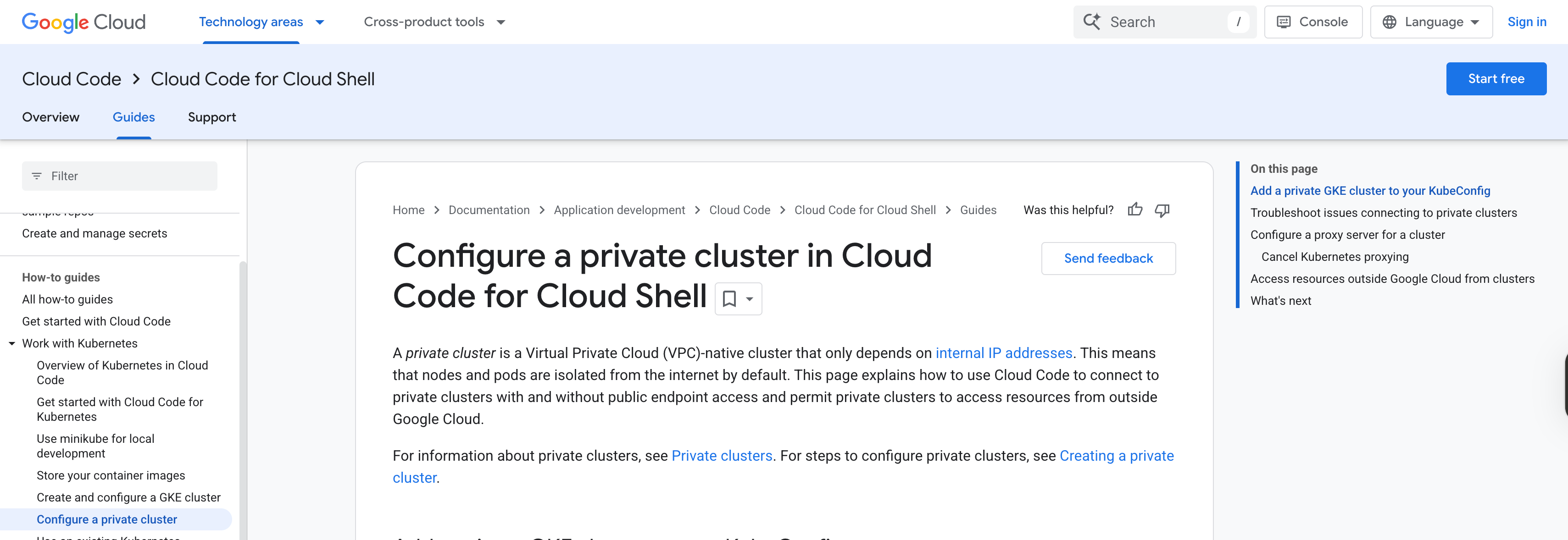
Similar approach to AWS:
- Control over virtual networking in the cloud with customizable network architecture
- Global VPC networks consisting of regional subnets connected by Google's global wide area network
- VPC Network Peering for private connectivity between different VPC networks
- Cloud VPN tunnels and Cloud Interconnect for connecting to on-premise infrastructure
- Private Service Connect for accessing Google APIs and services privately
- Firewall rules and routes for traffic control and management
Key differences from AWS:
- VPCs are global by default, whereas AWS VPCs are regional constructs
- Easier multi-region deployment without complex peering configurations
- Shared VPC allows centralized network management across multiple projects in an organization
- Superior global network backbone with lower latency between regions
- Simpler subnet management with automatic subnet expansion
When it makes sense:
Google Cloud VPC is best suited for organizations already using Google Cloud services, teams building global applications that need consistent networking across regions, or those requiring integration with Google Workspace and other Google services. It's also a strong choice for data-intensive workloads that benefit from Google's high-performance global network backbone.
Note: For teams that want multi-cloud flexibility with the ability to deploy on GCP, AWS, Azure, or other providers, including on-premise, from a single platform, without needing Google Cloud-specific networking expertise, Northflank provides a unified approach to private networking across multiple cloud providers.
Render provides automated private networking where services in the same region can communicate over their shared private network without traversing the public internet.
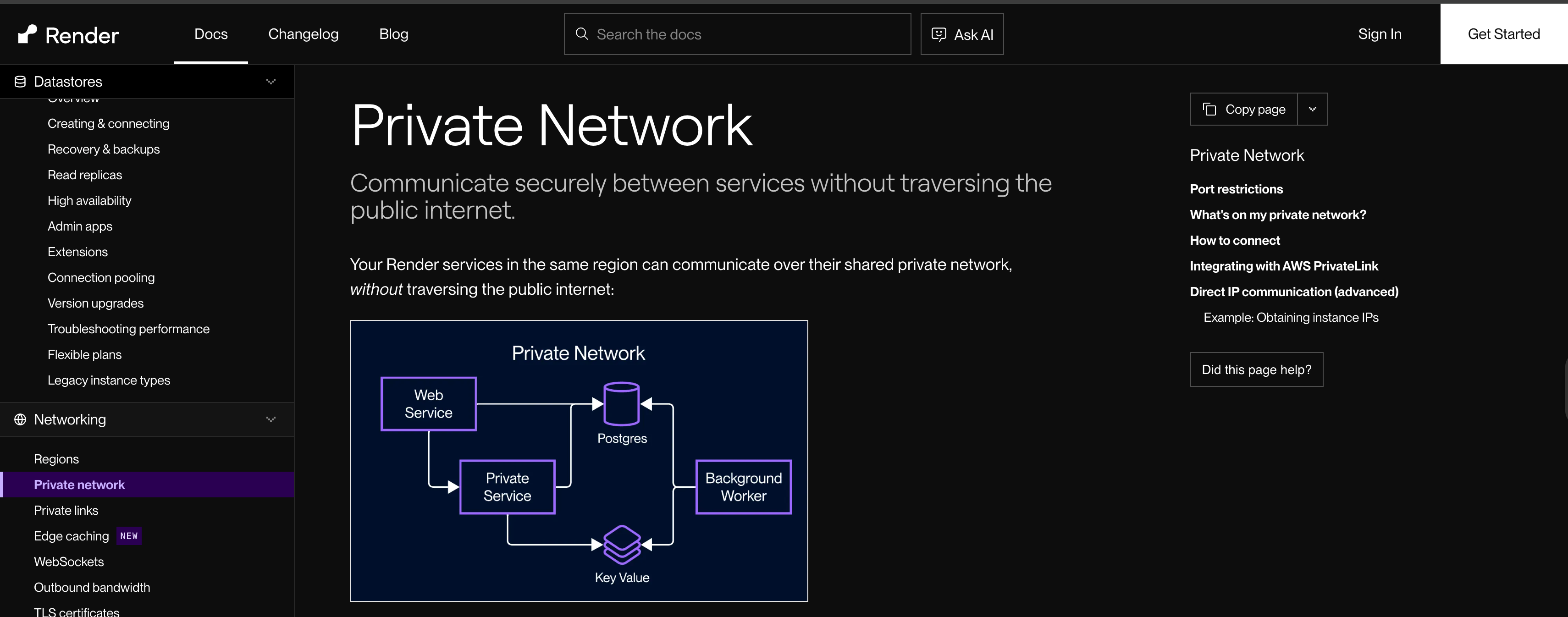
Private networking features:
- Unique hostname for each service on the private network
- Services can listen for traffic on almost any port using any protocol
- Stable internal hostnames and IPs that dynamically map to individual instance addresses
- Private services unreachable via public internet but accessible to other services on the same private network
- Fast, safe, and reliable communication without traversing the public internet
- Support for HTTP, TCP, and UDP protocols on private networks
Best use cases:
Render's private networking is excellent for simpler architectures where services need to communicate within a single region. It's ideal for startups and small teams building microservices applications without complex multi-region or hybrid cloud requirements. The simplicity and developer experience make it attractive for teams that want private networking without operational complexity.
Note: For applications that require cross-region private networking, app-level isolation, or need to scale beyond a single region deployment, Northflank provides these capabilities with a similarly straightforward developer experience.
Railway's private networking enables private communication between services in a project and environment, using encrypted Wireguard tunnels to create an IPv6 mesh network between all services.

Private networking approach:
- Encrypted Wireguard tunnels creating IPv6 mesh network between services
- Internal DNS names under railway.internal domain for each service
- Automatic resolution to internal IPv6 addresses
- Support for any valid IPv6 traffic including UDP, TCP, and HTTP
- Automated service discovery and high-speed internal networking
- Automatic TLS encryption for all traffic from edge to applications
When to consider Railway:
Railway is best for development teams and startups building cloud-native applications that don't require hybrid connectivity. The platform excels at rapid deployment and iteration with excellent developer experience. It's particularly suitable for teams comfortable with modern IPv6 networking and those building applications entirely in the cloud without legacy on-premise dependencies.
Note: Teams that need IPv4 support, cross-environment networking, or enterprise-grade security controls alongside Railway's developer experience will find Northflank offers these features while maintaining ease of use.
Selecting the best Heroku Private Spaces alternative depends on your specific requirements, technical capabilities, and organizational priorities.
| Use case | Best alternative | Why |
|---|---|---|
| Best developer experience with enterprise features | Northflank | Balance of powerful private networking, security controls, and ease of use without Kubernetes complexity |
| Multi-region and global applications | Google Cloud VPC or Northflank | Global networking model or multi-cloud capabilities for worldwide low-latency deployment |
| Cost optimization | Northflank | Pay-as-you-go with per-second billing offers significant savings over minimum monthly fees |
| Maximum control and customization | AWS VPC or Google Cloud VPC | Full control over network architecture, ideal for complex enterprise workloads with dedicated infrastructure teams |
| Simple private networking needs | Render or Railway | Prioritize developer experience and rapid deployment for cloud-native applications in single regions |
Private networking solutions provide teams with better options for securing applications and data. Alternatives like Northflank now provide comparable or superior capabilities with more flexible pricing and additional features than Heroku Private Spaces.
Start with our free sandbox tier to try Northflank. Check out our getting started documentation for guides on deploying your first applications with private networking, or book a demo to discuss your specific requirements.